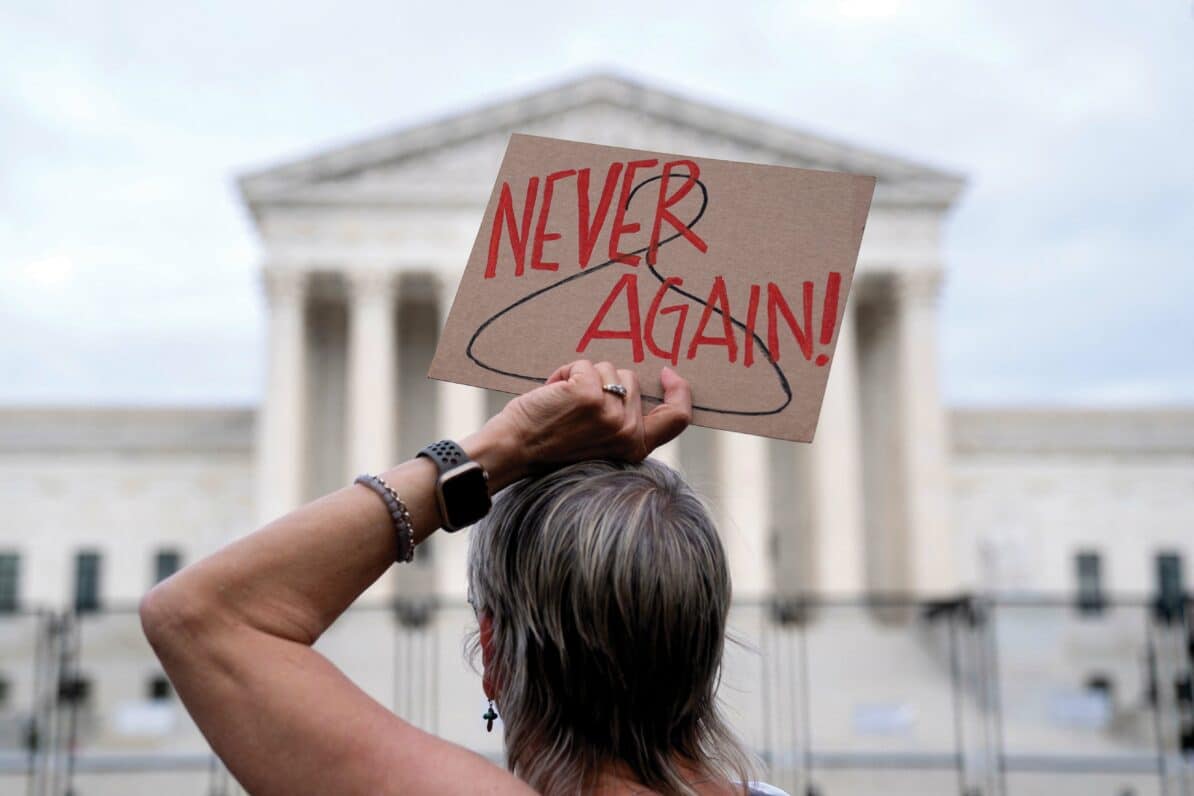Moment that mattered: Roe v Wade is overturned
In issue 47 we spoke to founder of the Jane Collective, Heather Booth, about the overturning of abortion rights in the US

A pro-choice demonstrator holds a sign in front of the US Supreme Court in Washington DC in May ahead of its ruling on the landmark Roe v Wade case. Photo: Stefani Reynolds S/AFP via Getty Images
24th June 2022 (Taken from: #47)
“I was horrified, but not surprised,” says Heather Booth, reflecting on the June announcement that the US Supreme Court had overturned Roe v Wade, the 1973 judgement that made access to abortion a constitutional right for women in the US. “I thought, there will be terrible consequences… There are women who will be harmed. Before Roe, there were septic abortion wards where almost every week women were dying, either [from] harm they did to themselves because they weren’t prepared to have a child or by going to some unscrupulous operator who took advantage of them.”
The overturning of Roe v Wade had been anticipated since the appointment of conservative Supreme Court justices Neil Gorsuch, Brett Kavanaugh and Amy Coney Barrett under the presidency of Donald Trump – and on 2nd May 2022 a leaked document published by Politico suggested that such a ruling was imminent. The next month the court voted six to three in favour of overturning Roe: Kavanaugh said the ruling, which returned the jurisdiction over abortion law to individual states, was made on the basis that the US constitution was “neither pro-life nor pro-choice” and that the move “returned the Court to a position of neutrality”. The dissenting liberal justices said the ruling meant that, “From the very moment of fertilisation, a woman has no rights to speak of. A state can force her to bring a pregnancy to term even at the steepest personal and familial costs.”
Booth is a civil rights activist who campaigned for women’s right to access abortion in the pre-Roe days. “I think this is the most intimate decision of a person’s life and one that really should be made by the person themselves. When or whether or with whom you have a child… it’s not something a politician [or] anyone else should decide for you,” she says. Her reaction to the 24th June ruling was “To go into high gear and to be organising … to be helping to develop plans of action with those organisations that were playing a leading role.”
Booth’s involvement with the cause of abortion rights stretches back to Chicago in the 1960s, when she founded the Jane Collective, a clandestine group that helped women access safe abortions. “I was a student and a friend of mine said that his sister was pregnant, not ready to have a child and nearly suicidal. He asked if I could help find a doctor who would perform an abortion,” she says.
Through her contacts in the civil rights movement she met surgeon Dr Theodore Howard who agreed to carry out the procedure. “I didn’t think much more about it. I thought it was doing a good deed for a friend who was in need,” says Booth. But word spread, and Booth found herself approached by other people. She introduced the women to Howard, and as inquiries increased she set up a system to answer people’s questions and guide them through the process.
After having been very responsive, Howard suddenly went out of contact. “I understood only later that he had been arrested for providing abortions,” says Booth. “But he didn’t turn me in.” Booth found another provider and formed the underground organisation. “Rather than tell people to call one of us using our own personal name, we said you should ‘call Jane’. We put out notices that said ‘Pregnant? Don’t want to be? Call Jane’, with a phone number”. Booth recruited other women to help with the work. “Over time, the women learned how to provide the procedures themselves,” she says. “The women of Jane performed 11,000 abortions before the Roe v Wade decision.” In 1972 seven Janes were arrested and charged with conspiracy to commit abortion. If found guilty they faced a maximum of 110 years in prison, but the group’s lawyer stalled the trial until the Roe verdict meant that the charges were dismissed.
Booth says that in the 49 years in which Roe v Wade remained in place, abortion has become an increasingly sharp dividing line in the culture wars in the US. “A portion of the Republican Party made a conscious decision to politicise the issue, put a great deal of money behind it and formed an alliance with both Catholic and evangelical churches,” she says. “It became a partisan issue, which it had not been before. Meanwhile, women were becoming an increasingly vocal force in politics and increasingly aligned with a Democratic Party that was more associated with policies that were supportive of women in the choices in our lives.”
Recently, says Booth, there has been “a chipping away, state by state, rule by rule” on abortion access. In Texas, for example, Senate Bill 8 was introduced in 2021, restricting abortion to the period before a foetal heartbeat can be detected, usually around the sixth week of pregnancy, at which stage women often don’t know they are pregnant. The bill also granted Texans an award of at least $10,000 in damages if they filed a successful civil lawsuit against someone who ‘aided or abetted’ an abortion after this time. “You can get a bounty, like an old-time bounty hunter…if you report on your sister, your friend, a taxi cab driver, a physician,” says Booth.
We are two votes short of having reproductive freedom written into the laws”
In 13 states, ‘trigger’ laws had been passed in advance that would go into effect the moment Roe was overturned, meaning that abortion under almost all circumstances swiftly became illegal. In other states, including Ohio, laws brought in a six-week limit. This led to a case which gained widespread coverage in July, of a ten-year-old Ohioan girl, pregnant as a result of rape, who was no longer able to access an abortion in her home state. President Biden referenced the case when signing a new executive order, which among other measures aimed to protect the right to access abortion medication. “Ten years old. Raped, six weeks pregnant. Already traumatised. Was forced to travel to another state,” he said. “Imagine being that little girl. Just – I’m serious – just imagine being that little girl.”
Abortion rights groups produced maps showing the distance that some women would now have to travel to reach a “sanctuary state” where they could legally access a termination. Within hours of the Supreme Court’s decision, the National Network of Abortion Funds, which helps pay for and organise transport for such women, received 33,000 new donations, totalling more than $3 million. Meanwhile, Google searches for information about vasectomies in the US increased by 400 percent.
On 15th July, the House of Representatives narrowly passed the Women’s Health Protection Act, designed to restore abortion rights at a federal level: not a single Republican voted in favour. It will now go to the Senate, where it is unlikely to pass, due to the ‘filibuster’, a procedure meaning that opposition parties can stop measures moving from debate to a vote unless 60 senators vote in favour of doing so. The Democrats currently have 51 senators, two of whom are opposed to filibuster reform. If they can gain two more senators in favour, they can push through filibuster reform – and pass the new abortion rights act. “We are two votes short… [of] having reproductive freedom written into the laws,” says Booth.
Booth’s current focus, therefore, is on mobilising voters ahead of the midterm elections in November, and she feels encouraged about what she’s seen in the aftermath of the Roe ruling. “There’s been extraordinary increases in voter registration by women, but also by men,” she says. “And this is across region, race, ethnicity, religion and all kinds of backgrounds. The real issue is, will there be enough people doing the mobilisation, registering and getting out the vote? That will make the difference in this election.”
Summing up the reasons why he voted to overturn Roe v Wade, Justice Clarence Thomas said that his fellow justices “should reconsider all of this Court’s substantive due process precedents, including Griswold, Lawrence, and Obergefell.” These cases relate to privacy, due process and equal protection, which could, if reconsidered, undermine the legality of same-sex relationships, same-sex marriage and access to contraception. While none of the other justices echoed Thomas’s sentiments – and some went out of their way to say such rights aren’t open to question – they have caused unease among civil rights activists.
“In the US, we are on a knife’s edge of which direction we will go,” says Booth. “One direction is a tyranny and authoritarian rule where all of these freedoms are challenged. But the other side is for greater freedom and democracy.” She remains hopeful, despite the court’s ruling. “The struggle for one of the greatest freedoms of our lives… is motivating people to organise,” she says. “When we organise, we can change this world.”
Slow Journalism in your inbox, plus infographics, offers and more: sign up for the free DG newsletter. Sign me up
Thanks for signing up.








